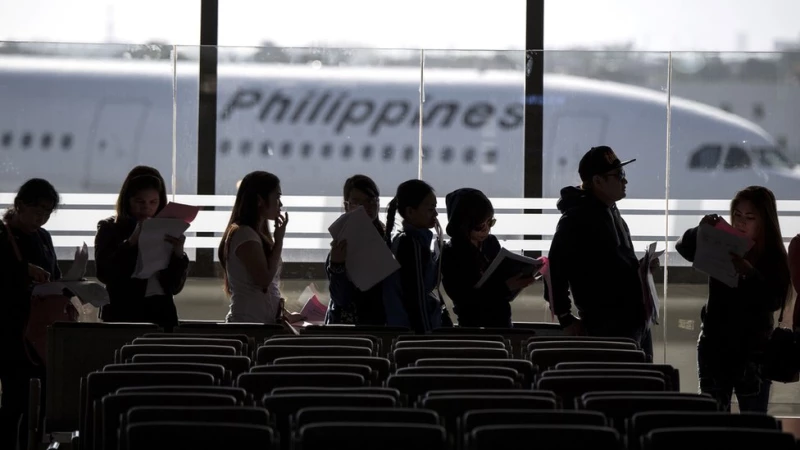Latest News
- Kuwait-Jordan Durra Field Joint Statement Rejected By Iran
- GTD Cracks Down On Vehicle Noise Pollution In Sulaibiya
- Mystery Of Dead Fish At Shuwaikh Beach Sparks Urgent Action
- MEW To Complete Links With The Interior And Justice Ministries B...
- 8 Expats Jailed For Bribing An Officer To Obtain Driver's Licens...
- Weekend Weather Is Expected To Be Hot
- From Tomorrow, Traffic Diversion On Third Ring Road
- Ministry Of Health Refute Rumors On Non-availability Of Antibiot...
- Amir Of Kuwait And Jordan King Renew Commitment To Regional Secu...
- 37 Arrested With Narcotics And Firearms
- Outrage Over Candidate's Arrest
- Six Stores Shut Down In Jahra For Selling Fake Goods
The Kuwaiti-Philippine Talks Failed To Lift The Domestic Worker Ban

Al-Jarida Daily reported that recent discussions between Kuwait and the Philippines, which included the Ministry of Foreign Affairs, the Public Authority for Manpower, and a visiting Philippine delegation, have failed to resolve the issue of the ban on sending domestic workers.
Kuwait deemed the Philippine request for the continued operation of embassy shelters illegal, despite initial progress and a friendly atmosphere. Domestic worker specialist Bassam Al-Shammari expressed disappointment at the lack of positive outcomes from the negotiations.
In an effort to resume bilateral discussions, the Philippines plans to invite Kuwait for an official visit to Manila. Kuwait, however, remains firm in its position regarding the closure of the shelters as a condition to lifting the ban.
In the event that the Philippine side continues to insist on operating these shelters, the negotiations may fail and the situation may revert to square one. The moratorium decisions issued by both countries earlier remain in effect. During the negotiations, the Philippine side raised concerns over the functioning of expatriate worker shelter centers affiliated with the "Manpower Force," including issues like workers remaining absent for months without returning to Manila and a lack of a clear mechanism for ensuring workers' financial rights.
The Philippines has cited these concerns as justification for retaining the shelters and withholding workers' releases. Al-Shammari stressed the need for Kuwait to sign more memorandums of understanding with labor-exporting countries such as Nepal, Indonesia, and Ethiopia, rather than relying on just a few countries.
As Ramadan approaches and the demand for domestic workers increases, having a diverse pool of labor-exporting countries would reduce recruitment costs and facilitate hiring of domestic workers. The ban on visas for the Filipino community in Kuwait was imposed in May last year due to a number of violations observed by the Public Authority for Manpower.
The violations included housing workers in private homes or unauthorized accommodation centers, violating residency laws, and reporting absenteeism. The decision also noted instances where domestic worker recruitment offices intervened in the withdrawal of workers from citizens’ homes under the pretense of contract completion, which is against laws and regulations. In addition to pressure on employers to comply with contractual clauses they didn't want, the Philippine embassy was criticized for treating citizens inappropriately.
Trending News
-
 Kuwait Implements Home Biometrics Services Ahead O...
14 April 2024
Kuwait Implements Home Biometrics Services Ahead O...
14 April 2024 -
 Kuwait Airways Provides Update On Flight Schedule...
14 April 2024
Kuwait Airways Provides Update On Flight Schedule...
14 April 2024 -
 Kuwait Airways Introduces Convenient Home Luggage...
15 April 2024
Kuwait Airways Introduces Convenient Home Luggage...
15 April 2024 -
 Expat Residency Law Amended By Kuwait Ministerial...
20 April 2024
Expat Residency Law Amended By Kuwait Ministerial...
20 April 2024 -
 Two Expats Are Arrested For Stealing From Salmiya...
17 April 2024
Two Expats Are Arrested For Stealing From Salmiya...
17 April 2024 -
 Kuwait Airways Resumes Flights To Beirut And Oman...
15 April 2024
Kuwait Airways Resumes Flights To Beirut And Oman...
15 April 2024 -
 Temperature Increases Cause Electricity Load Index...
21 April 2024
Temperature Increases Cause Electricity Load Index...
21 April 2024 -
 Thief Returns Stolen Money With An Apology Letter...
15 April 2024
Thief Returns Stolen Money With An Apology Letter...
15 April 2024 -
 3 Expats Caught In Salmiya With 213 Bottles Of Loc...
23 April 2024
3 Expats Caught In Salmiya With 213 Bottles Of Loc...
23 April 2024 -
 Ministry Of Interior Denies Social Media Rumors Re...
13 April 2024
Ministry Of Interior Denies Social Media Rumors Re...
13 April 2024












Comments Post Comment